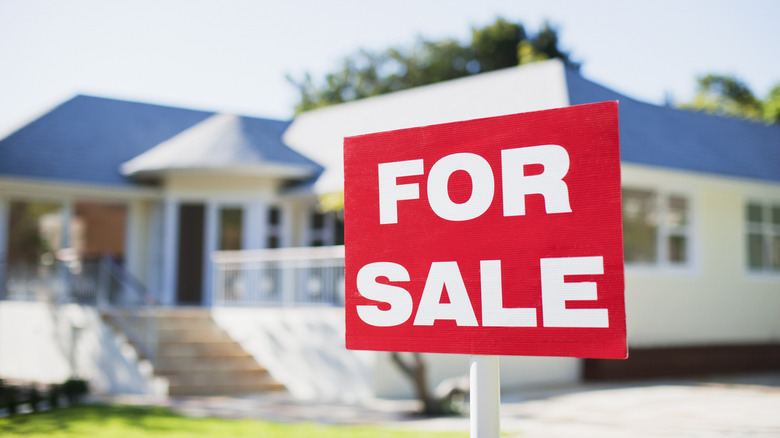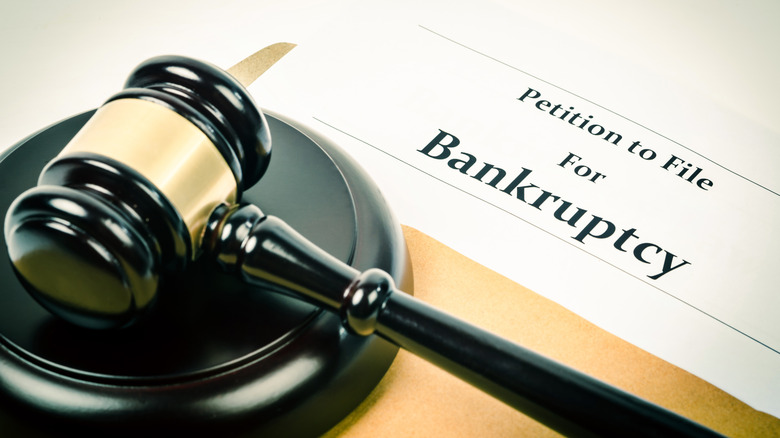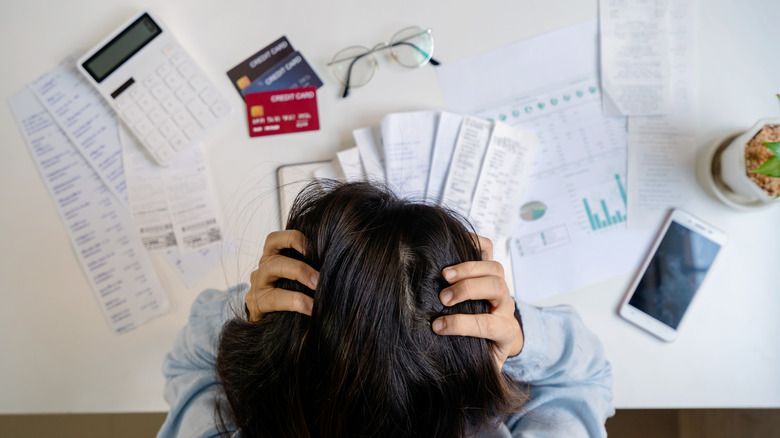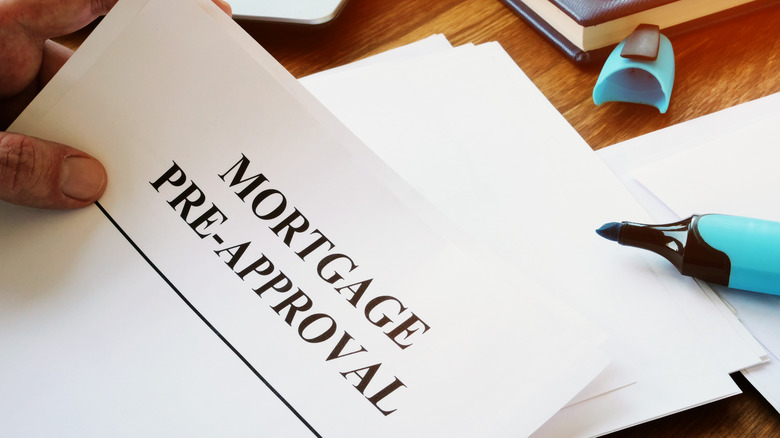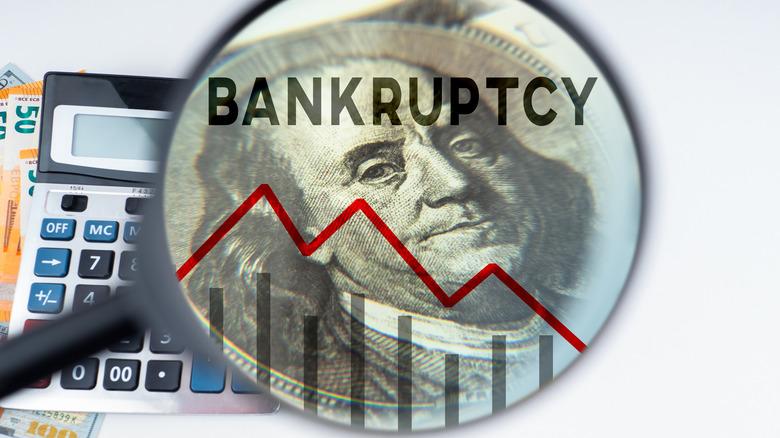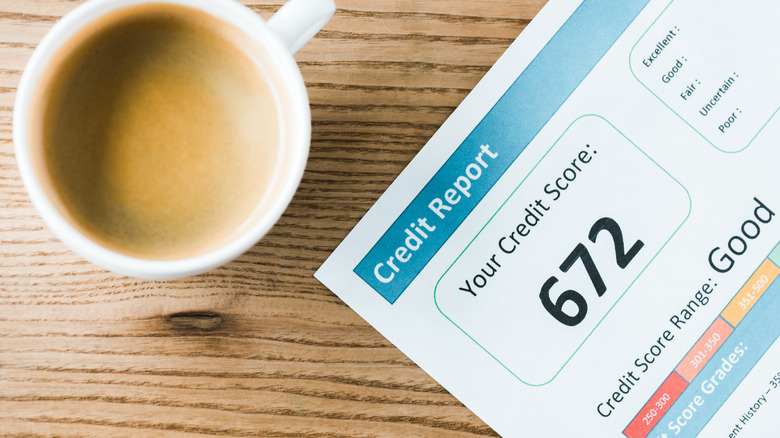What You Need To Know About Buying A Home After Bankruptcy
Filing for bankruptcy is a last resort for consumers who find themselves in a tough financial situation. Through this process, individuals ask a court trustee and judge to release them from the responsibility of paying off their debt. The applicant has to prove that their debt is so cumbersome that they can't afford to pay it (via Debt). The U.S. Department of Justice reports that during the fiscal year 2021, more than 412,000 Americans filed for bankruptcy.
"If you can pay off your debts outside bankruptcy, you should," bankruptcy attorney David Leibowitz, a past chairman of the consumer bankruptcy committee of the American Bankruptcy Institute, told CNBC. "However, if your wages are being garnished, your car has been seized, and you're being hounded by collection agencies, bankruptcy may be imperative."
Bankruptcy is a serious matter and it takes a significant amount of work to file the case. It also has short and long-term consequences, including showing up on your credit history for up to 10 years. That's especially challenging for people who want to reestablish credit, qualify for a mortgage, and buy a home. Still, bankruptcy offers the opportunity for a fresh financial start. Here's a look at what you need to know about buying a home after bankruptcy.
Different types of bankruptcy can impact your ability to buy property
Not all bankruptcies are the same. Chapter 7 bankruptcy is the most common type of bankruptcy. With Chapter 7, which is also known as liquidation, an individual will have their unsecured debts, such as unpaid credit card debt, cleared (via Credit Karma). The individual will have to forfeit their assets including money and property.
Chapter 13 bankruptcy typically applies to individuals who have a steady income but have fallen behind on their payments. This type of bankruptcy helps prevent foreclosure so applicants can retain their homes. It also gets the individual into a simplified repayment plan that's set up by the court and passed along to creditors.
Neither type of bankruptcy allows for debt forgiveness on alimony, child support, and taxes. Chapter 7 bankruptcy is often completed in around 90 days, while Chapter 13 bankruptcy can take 3 to 5 years to complete. While potential creditors never want to see a bankruptcy on a credit report, they may look more favorably on a Chapter 13 bankruptcy. That's because it's focused on repayment, instead of forgiveness, such as with Chapter 7 bankruptcies.
You'll have to wait to buy a home post-bankruptcy and the time frames can vary
Filing for bankruptcy can benefit you in the short term by giving you relief from your debt. However, in the long-term outlook, you'll face a penalty. A Chapter 7 bankruptcy stays on your credit for 10 years, and a Chapter 13 bankruptcy stays for 7 years.
According to AllLaw, individuals who filed for bankruptcy may be eligible for Federal Housing Administration (FHA) loans, which aim to help consumers with low credit scores. For example, those who file for Chapter 7 bankruptcy may be eligible for an FHA loan two years after their debt is forgiven. But the individual will have to show good credit history during that time. Consumers who file for Chapter 13 bankruptcy can apply for an FHA loan within 12 months after they file their case, provided they have made all of their repayments on time. But note that if you want to buy a new home, you will have to ask the bankruptcy court to allow you to buy that property.
Consumers who want to apply for a conventional loan, such as those from a bank or mortgage company, will have to wait 24 to 48 months following a Chapter 7 or a Chapter 13 bankruptcy. Veterans with a Chapter 7 bankruptcy can apply for a VA loan 2 years following the discharge of their debt. The individual will also need to have good credit history during that time.
You'll need to rehab your credit score so you'll be in better standing before you can buy property
Bankruptcy doesn't stay on your credit for life, but it can significantly lower your credit score for a long time. This can make it challenging to get approved for credit cards, loans, and other financial matters, like getting a job or renting an apartment. But often, people who file for bankruptcy, already have damaged credit because they have been overwhelmed with debt. The good news is that you'll be able to start improving your credit report regarding old debts, such as unpaid credit cards, and late payments. A Chapter 7 bankruptcy can wipe away this debt, and a Chapter 13 bankruptcy sets you on a path to repayment.
Here's what you need to know — credit scores are determined by credit bureaus who factor in your good financial habits, such as making payments on time and not carrying too much debt. These FICO scores range from 300 to 850 (via Debt.org). The higher your score is, the better chances you have of getting approved for credit, including a mortgage loan. This can also impact the interest rate you'll receive and the amount that you can borrow.
When you file for bankruptcy, typically your credit scores will go down. Credit Repair.com points out that borrowers' scores may dip anywhere from 130 to 240 points. But you can build those scores back up by never missing a payment. That means it's important to pay all debts on time, including student loans and income tax payments. You can also boost scores by keeping new accounts at a minimum and paying down debts that are close to the credit limit.
You'll need to write an explanation letter to potential lenders
One of the ways to re-establish your status as a good candidate for a loan is to write a bankruptcy explanation letter. It may seem a little odd or even overkill but it may pay off. Better Credit Blog.org says the letter is your chance to explain your bankruptcy to anyone who pulls your credit and could be considering issuing you credit.
Since your goal is to buy a home, you want to explain why you're a good candidate for a loan post-bankruptcy. The letter should detail why you filed for bankruptcy such as losing your job, a death in the family, a divorce, or any other reasonable circumstance. But don't say you were irresponsible about spending or failed to pay off debt — that could make lenders not want to offer you a loan.
Next, you need to explain how the bankruptcy is in the past and not something you plan to ever do again. Explain how you have developed new spending habits to help you stay on top of your finances. For example, if your bankruptcy was for a specific reason such as a layoff, explain how you now have gainful employment. This explanation letter can help position you as a better applicant for a mortgage. But your word alone might not be enough. Along with the letter, it may also be helpful to submit supporting documents including tax returns, pay stubs, and medical records that apply to your situation.
You may have to shop around to find a lender who will work with you
Getting your credit in shape is an important first step to qualifying for a loan. Then you'll need to find a lender who is willing to take you on. People who have filed for bankruptcy are often viewed at a higher risk to default on a loan. Keep tabs on your credit to make sure it's in good shape before looking for a lender. Fix any mistakes on your credit report and start saving for a down payment to show you're a serious candidate to buy a home. Besides, having a down payment will help lower how much you need to borrow.
Research lenders that offer any mortgage types that apply to you including FHA, VA loans, and conventional loans. Then start shopping around and getting quotes from a variety of lenders. You might be surprised that all the rates aren't the same — that's because post-bankruptcy, some lenders will give you better rates than others based on your history.
If you can, get a cosigner to help you qualify for the loan. Typically, a cosigner has good credit and agrees to pay the loan if you can't do it. It's a tough ask but sometimes a family member or friend will agree to cosign, especially if they know how hard you've worked to come back from bankruptcy (via The Ascent).
Before you can buy, you'll have to get pre-approved for a loan
Getting pre-approved for a mortgage after bankruptcy can require a little extra work because you'll likely have to show proof of your improved financial situation. A lender will ask for the basics like your employment information and income, as well as pull a current credit report. They may ask for additional supporting documentation including that explanation letter noted earlier, as well as the previous year's taxes, and pay stubs.
As Debt.org explains, a pre-approval is a streamlined process that gives you an idea of what your final mortgage amount and terms will look like. It's important to get pre-approved because some real estate agents or brokers won't work with you without one. It shows you're serious about buying a property, and it details how much you can afford to buy. A pre-approval is only good for about 90 days so you might need to renew it if your home search is a lengthy one.
If you have multiple bankruptcies, it might be more challenging to qualify or get approved to buy a home
Navigating the process of buying a home after bankruptcy can be tough enough but it's even tougher for people who have more than one bankruptcy. As noted earlier, bankruptcies can haunt your credit for a long time. With multiple bankruptcies, you are simply adding more time that the bankruptcies will linger on your credit report.
According to Forbes, an individual can file for bankruptcy an unlimited number of times. But filing for multiple bankruptcies only prolongs the damage to your credit report and puts you further at risk of not getting approved for a loan. For example, with poor credit, you might not qualify for a specific job position. This could further hurt your chances of having a good income and being able to show proof of the ability to pay your bills.
If you do decide to file for bankruptcy more than once, know that there are different waiting periods for different types of bankruptcy. For example, if you file for Chapter 7 bankruptcy and later want to file for Chapter 7 bankruptcy again, you will have to wait 8 years between filings. But if you want to file a Chapter 13 after a Chapter 7 bankruptcy, you will only have to wait four years between filings.
Qualifying for a mortgage post-bankruptcy can be tough but these tips can make the process smoother
For the best chance to qualify for a mortgage after bankruptcy, you'll need to do a lot of things right, and you'll need to do them consistently. For starters, monitor your credit report so that you'll always know your status. You can sign up for a monitoring service that alerts you of any account status changes and increases or decreases in your score. Many also feature simulators so you can see what actions could improve your score.
Lending Tree advises paying all of your bills on time, and not opening too many credit cards, both of which can help keep your credit in good standing. Sometimes it makes more sense to wait to buy a home, especially if you can't get preapproved for a good interest rate. Start saving for a down payment, which potentially can help you secure a better interest rate.
Getting a car loan and paying it faithfully is a good step to show your creditworthiness in paying off a big-ticket item. It may help improve your credit score too. According to Debt, good money habits can significantly improve your credit within four years, helping put you in good standing for a home loan.
